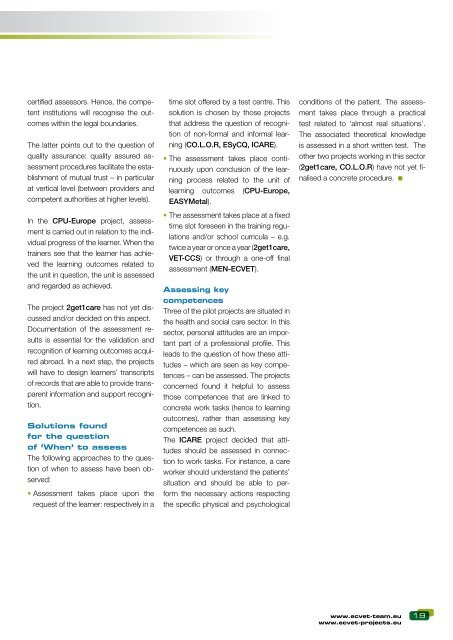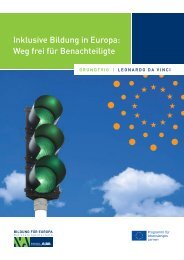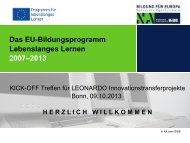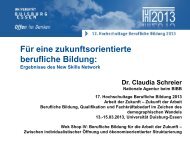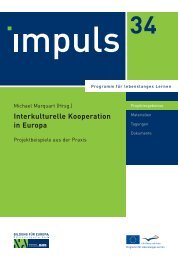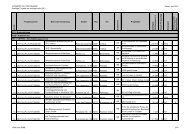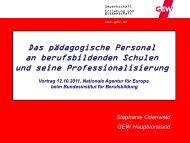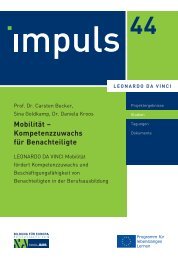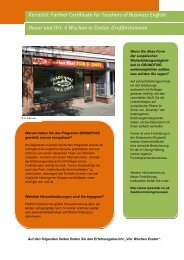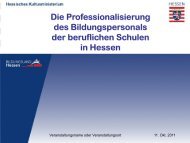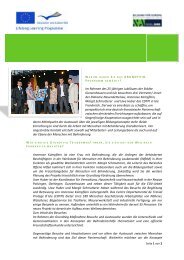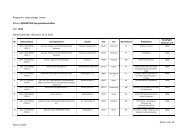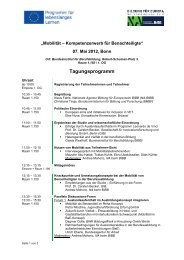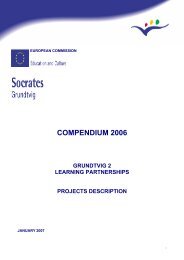Create successful ePaper yourself
Turn your PDF publications into a flip-book with our unique Google optimized e-Paper software.
certified assessors. Hence, the competent<br />
institutions will recognise the outcomes<br />
within the legal boundaries.<br />
The latter points out to the question of<br />
quality assurance: quality assured assessment<br />
procedures facilitate the establishment<br />
of mutual trust – in particular<br />
at vertical level (between providers and<br />
competent authorities at higher levels).<br />
In the CPU-Europe project, assessment<br />
is carried out in relation to the individual<br />
progress of the learner. When the<br />
trainers see that the learner has achieved<br />
the learning outcomes related to<br />
the unit in question, the unit is assessed<br />
and regarded as achieved.<br />
The project 2get1care has not yet discussed<br />
and/or decided on this aspect.<br />
Documentation of the assessment results<br />
is essential for the validation and<br />
recognition of learning outcomes acquired<br />
abroad. In a next step, the projects<br />
will have to design learners’ transcripts<br />
of records that are able to provide transparent<br />
information and support recognition.<br />
Solutions found<br />
for the question<br />
of ‘When’ to assess<br />
The following approaches to the question<br />
of when to assess have been observed:<br />
• Assessment takes place upon the<br />
request of the learner: respectively in a<br />
time slot offered by a test centre. This<br />
solution is chosen by those projects<br />
that address the question of recognition<br />
of non-formal and informal learning<br />
(CO.L.O.R, ESyCQ, ICARE).<br />
• The assessment takes place continuously<br />
upon conclusion of the learning<br />
process related to the unit of<br />
learning outcomes (CPU-Europe,<br />
EASYMetal).<br />
• The assessment takes place at a fixed<br />
time slot foreseen in the training regulations<br />
and/or school curricula – e.g.<br />
twice a year or once a year (2get1care,<br />
VET-CCS) or through a one-off final<br />
assessment (MEN-ECVET).<br />
Assessing key<br />
competences<br />
Three of the pilot projects are situated in<br />
the health and social care sector. In this<br />
sector, personal attitudes are an important<br />
part of a professional profile. This<br />
leads to the question of how these attitudes<br />
– which are seen as key competences<br />
– can be assessed. The projects<br />
concerned found it helpful to assess<br />
those competences that are linked to<br />
concrete work tasks (hence to learning<br />
outcomes), rather than assessing key<br />
competences as such.<br />
The ICARE project decided that attitudes<br />
should be assessed in connection<br />
to work tasks. For instance, a care<br />
worker should understand the patients’<br />
situation and should be able to perform<br />
the necessary actions respecting<br />
the specific physical and psychological<br />
conditions of the patient. The assessment<br />
takes place through a practical<br />
test related to ‘almost real situations’.<br />
The associated theoretical knowledge<br />
is assessed in a short written test. The<br />
other two projects working in this sector<br />
(2get1care, CO.L.O.R) have not yet finalised<br />
a concrete procedure.<br />
<strong>www</strong>.<strong>ecvet</strong>-<strong>team</strong>.<strong>eu</strong> 19<br />
<strong>www</strong>.<strong>ecvet</strong>-projects.<strong>eu</strong>


